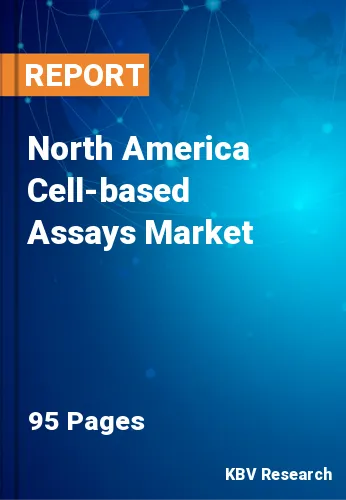The North America Cell-based Assays Market would witness market growth of 7.5% CAGR during the forecast period (2022-2028).
Phenotypic screening of chemicals in a humanized multicellular environment generates more detailed data, allowing a more rapid translation of findings into clinical practice. Using cells derived from blood, tissue, or differentiated stem cells, human primary cell-based assays, like cell viability assays, cell proliferation assays, and GPCR assays, were developed for high-content analysis in several distinct disease area indications.
These assays include cell viability assays, cell proliferation assays, and GPCR assays. These high-throughput assays speed up the process of drug discovery by giving the most promising candidate in the biological context that matters the most. Drug development has progressed from a limited target-based screening in a basic cell-based assay that had little physiological relevance to multicellular cell-based biochemical and functional assays in disease-relevant platforms.
Cell-based assays for each stage of the drug development process have been developed in recent years to offer a deeper comprehension of the intricate interactions to researchers that take place between the networks and pathways that are a part of these cellular processes. Assays may be built to best simulate the disease state if the patient has access to a variety of cell types and are able to use both existing and innovative technologies.
This will lead to increased performance in translational research. In both biomedical research and drug discovery screening applications, cellular assays, also known as cell-based assays, can be utilized to efficiently assess biological activity, cytotoxicity, biochemical processes, and off-target interactions.
Cancer has a significant impact on society throughout the United States. Cancer statistics reflect what occurs in big populations and provide a temporal picture of the societal burden of cancer. According to the National Cancer Institute, In the United States, an anticipated 1,806,590 new instances of cancer were identified in 2020, and 606,520 people died due to the disease. Breast cancer, colon and rectum cancer, lung and bronchus cancer, bladder cancer, prostate cancer, melanoma of the skin, kidney and renal pelvis cancer, non-Hodgkin lymphoma, endometrial cancer, leukemia, thyroid cancer, pancreatic cancer, and liver cancer are the most prevalent types of cancer.
The US market dominated the North America Cell-based Assays Market by Country in 2021; thereby, achieving a market value of $7.2 billion by 2028. The Canada market is experiencing a CAGR of 10% during (2022 - 2028). Additionally, The Mexico market would exhibit a CAGR of 9% during (2022 - 2028).
Based on Application, the market is segmented into Drug Discovery, Basic Research and Others. Based on End User, the market is segmented into Pharmaceutical & Biotechnology Companies, Academic & Research Institutes and Contract Research Organizations (CROs). Based on Products & Services, the market is segmented into Assay Kits, Reagents, Microplates, Probes & Labels, Instruments & Software and Cell Lines. Based on countries, the market is segmented into U.S., Mexico, Canada, and Rest of North America.
Free Valuable Insights: The Global Cell-based Assays Market is Estimated to reach $24.9 Billion by 2028, at a CAGR of 8.2%
The market research report covers the analysis of key stake holders of the market. Key companies profiled in the report include Becton, Dickinson and Company, Bio-Rad Laboratories, Inc., Corning Incorporated, Charles River Laboratories International, Inc., Danaher Corporation, F. Hoffmann-La Roche Ltd., Lonza Group AG, Merck Group, Promega Corporation and Thermo Fisher Scientific, Inc.
By Application
By End User
By Products & Services
By Country
Our team of dedicated experts can provide you with attractive expansion opportunities for your business.

